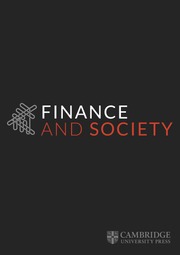Article contents
The end of an illusion
Published online by Cambridge University Press: 09 November 2023
Extract
Mainstream economics must be conceived of as a sort of ‘dangerous’ knowledge – because its models (like the idea of efficient markets) offer no explanation for the regularity of crises and crashes in financial markets in the last decades; and because these models were also employed in the implementation and justification of these very markets. Just as the Lisbon earthquake of 1755 once shook modern theodicy to its foundations, so the financial tremors of the last twenty years threaten to undermine the scientific status of economic theory. What is at issue is nothing less than the validity, possibility, and tenability of a liberal or capitalist oikodicy, a theodicy of the economic universe. It is likely that we are dealing here with one of the greatest and most fatal of errors of modern economics.
- Type
- Forum: Money’s other worlds
- Information
- Creative Commons
- This is an Open Access article, distributed under the terms of the Creative Commons Attribution-NonCommercial-No Derivatives licence (http://creativecommons.org/licenses/by-nc-nd/4.0/), which permits noncommercial re-use, distribution, and reproduction in any medium, provided the original work is unaltered and is properly cited. The written permission of Cambridge University Press must be obtained for commercial re-use or in order to create a derivative work.
- Copyright
- © 2015 The Author(s)
References
- 2
- Cited by


